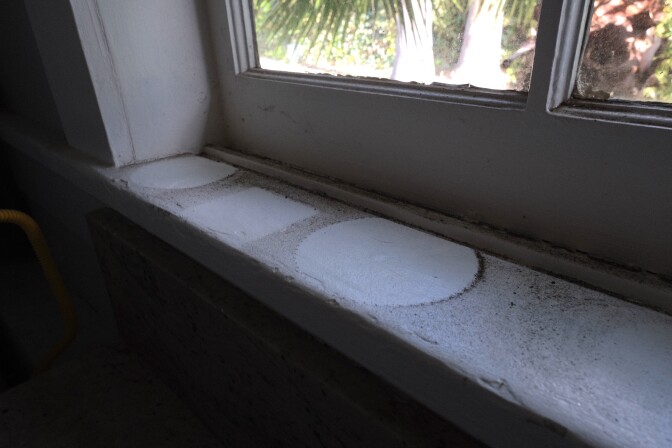A new California law clarifies that landlords — not tenants — are responsible for cleaning rental homes covered in debris from disasters, such as the Palisades and Eaton fires that devastated parts of L.A. County earlier this year.
On Friday, Gov. Gavin Newsom signed Senate Bill 610, which stipulates that when natural disasters cause damage to rental housing, “it shall be the duty of a landlord” to remove “hazards arising from the disaster, including, but not limited to, the presence of mold, smoke, smoke residue, smoke odor, ash, asbestos or water damage.”
The law addresses the confusion many renters grappling with the aftermath of the January fires have faced. Many apartments were left standing but choked with toxic ash. Some landlords refused to clean the debris, leaving tenants unable to return home.
In the months since the fires, some local officials gave unclear or non-committal answers about tenants’ rights and landlords’ clean-up responsibilities.
LAist reporting informed push for legislative change
State Sen. Sasha Renée Pérez, a Democrat representing a district that includes Pasadena and Altadena, said the legislation she introduced was driven by tenant complaints her office received, as well as LAist’s reporting on the lack of clarity over clean-up procedures in rental housing.
“The reporting that you all had done over at LAist was also really helpful,” Pérez said. “We're hearing directly from constituents and have heard all of these concerns. And here's reporting from journalists in the Los Angeles area to further support these claims that I’m making that this is a major issue.”
An analysis of the bill presented to the Senate Judiciary Committee cited stories by LAist and reporting from the Los Angeles Times to show that existing law had left tenants confused about how to get their homes cleaned.
The backstory
Last month, L.A. County settled a lawsuit brought by tenants in Altadena who alleged that county public health officials had failed to protect tenants dealing with post-fire damage to rental homes. The county agreed to enforce cleaning requirements for landlords.
The city of Pasadena is facing a similar lawsuit.
Shortly after the Eaton Fire, Pasadena health officials told residents that ash spewed into homes was hazardous and should be professionally remediated. But city code inspectors told renters that the presence of ash did not violate local habitability codes because those codes did not explicitly contain the word “ash.”
City housing officials told tenants worried about the lack of clean-up that they could sue their landlord.
SB 610 will change how city officials communicate to tenants and landlords around these issues in the future, said Lisa Derderian, Pasadena’s spokesperson.
“This law makes important changes in the obligations of a landlord to the tenant that will play out in messaging,” Derderian said in an email to LAist. “The city takes habitability concerns for any cause seriously and inspects accordingly.”
Similar challenges played out in the city of L.A. During a February web meeting, L.A. housing official Robert Galardi told renters they were responsible for cleaning inside their own units, a claim that was contradicted by a housing department spokesperson later that month when LAist asked about the city’s guidance.
In response to LAist’s questions, Housing Department spokesperson Sharon Sandow said “landlords must remediate hazardous ash debris in rental units.”
Clearing up confusion created by gaps in the law
The law also requires landlords to let tenants move back in at their pre-disaster rental rate and mandates that landlords return rental payments for months when tenants were unable to live in the unit.
Landlord groups said most property owners already have taken responsibility for cleaning their rental housing units.
Debra Carlton with the California Apartment Association said the new law clarifies but does not broaden the scope of what landlords must do in the wake of a natural disaster. The law makes it clear that landlords will not have to rebuild destroyed properties.
Carlton said the law “reaffirms common-sense standards for addressing debris and smoke damage before a unit is reoccupied.”
Tenant advocates said the law’s passage is a victory for tenants who’ve long argued that the responsibility for cleaning rental properties lies with the landlords who own those properties.
Katie Clark — an organizer with the Altadena Tenants Union, a group created in the wake of the Eaton Fire — said SB 610 finally clears up the confusion around this issue.
“This closes that gap,” Clark said. “There is no nuance. There is no room for misunderstanding. [Ash] is absolutely now included in habitability questions.”
Some renters already have moved on
The change may be coming too late for some renters. More than 10 months after the fires, one couple told LAist they have given up on returning to their previous home.

Marah Eakin and Andrew Morgan were renting a home in Pasadena that had smoke damage from the Eaton Fire. They said their landlord never agreed to clean the home, despite testing they said they paid for that revealed high levels of lead.
“We didn't see an end in sight,” Eakin said. “For a while, we were moving every five days, every week, and that was terrible.”
The couple said they and their 7-year-old twins moved nine times before settling down in July with a long-term lease on a home in Altadena. Morgan said the instability was especially tough on their kids.
“When they say that they miss the old house, some other old stuff, it's just heart-wrenching,” he said.
Trevor Barrocas, a property manager with Cornerstone R/E Management, told LAist that Eakin and Morgan’s landlord submitted a claim to California’s Fair Plan insurance program requesting remediation, but the claim was initially denied.
“The property has still not been fully remediated,” Barrocas said in an email to LAist. He said efforts to clean the property are ongoing.
“The property owner has waited through months-long delays by CA Fair Plan for answers, approvals and direction,” Barrocas said. “The unprecedented circumstances and result of the January fires have… been felt by landlords, homeowners and tenants alike.”















